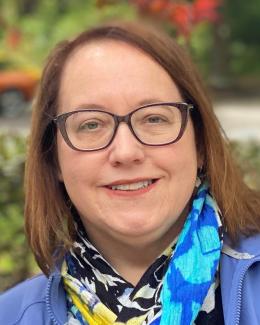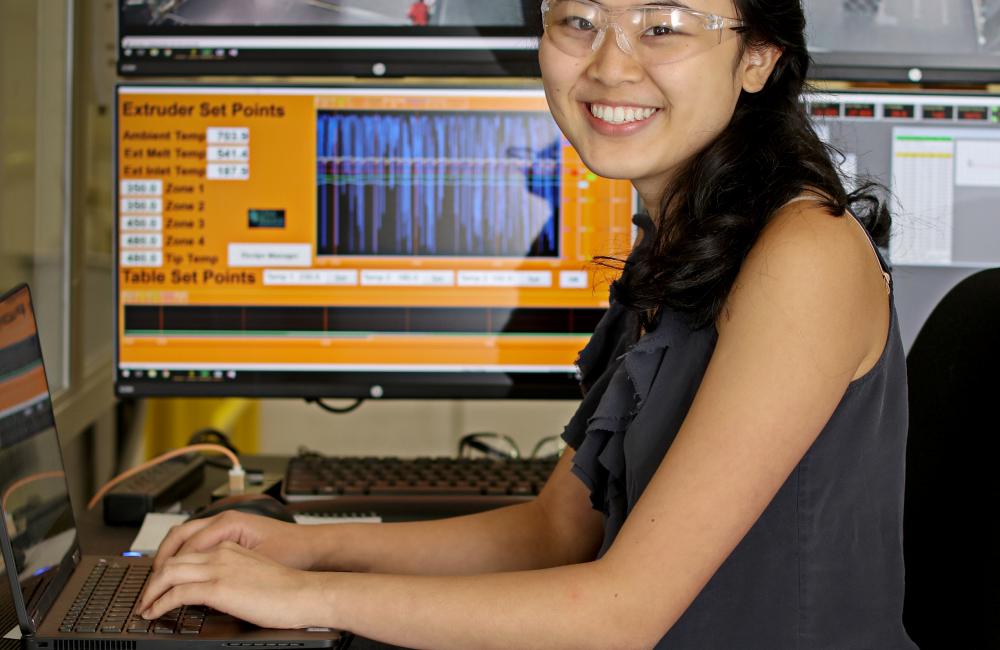Inspired by her computer science studies and the possibilities of 3D-printing, intern Elizabeth Yeoh-Wang found a way to combine those pursuits as she worked on a software project at the Manufacturing Demonstration Facility (MDF) at Oak Ridge National Laboratory (ORNL) last summer.
Elizabeth, a rising sophomore at Harvard University, worked on the beginning stages of “slicing” software to control a 5-axis extruder as it prints objects at the MDF, a U.S. Department of Energy Office of Energy Efficiency and Renewable Energy User Facility at ORNL. The software analyzes the design of an object to be printed, or “slices” the design, and then guides the extruder as it forms an object layer-by-layer.
The extruder head of a conventional 3D printer moves up and down—or alternately, the surface being printed on moves up and down—creating the Z axis. As the extruder moves sideways, the X and Y axes come into play. In essence, the object is printed in 2D planes that are stacked on top of each other. With the 5-axis extruder, designers will have two additional angles to consider when building an object.
Elizabeth found the work fascinating. “I like the computer science part of it—taking a shape and breaking it down into paths. It would seem that process is pretty straightforward, but it isn’t because of the way 3D-printing works,” she said.
The spectrum of work possible with computer science knowledge is what drove Elizabeth to pursue the field. “There are so many applications; you can go into almost any field and find some way to use your computer science skills. That’s a big draw for me because I like learning about so many different things,” she added.
She has already tried out some of those applications. During high school in New York City, Elizabeth interned at Memorial Sloan Kettering Cancer Center on a coding project; she was a summer student in the Neural Systems lab at Rockefeller University where she worked on more than one software application; and she interned at tech solutions company IvanExpert, where she developed an iOS app with Mac usage tips.
Her interest in computer science began in eighth grade with a mandatory coding class at the Chapin School in New York. At Harvard, Elizabeth is intent on earning her undergraduate degree in the subject, and she is also enrolled in a dual major program in pursuit of a master’s degree in harp performance with the New England Conservatory of Music. She is an active member of the Harvard Computer Society, plays with the Harvard-Radcliffe Orchestra, and is an announcer on Harvard Radio Broadcasting (WHRB).
Elizabeth heard about the opportunity to intern at ORNL through a newsletter at Harvard. “3D printers had captivated my imagination when I was younger. I saw it as a machine that could do almost anything,” she said.
The programming work at ORNL is just the beginning of a larger project, and Elizabeth has been particularly careful in her work to account for that. “I’ve added comments to the code I’m developing to describe each parameter and its function. Commenting code is like doing yourself a service, so you know what’s happening without having to read it through and recall what each parameter does. The goal is to leave something nicely packaged for myself and, more importantly, for others,” she said. “Even if my exact code doesn’t get used, concepts from it can be utilized or adapted.”
Elizabeth said the sheer size of ORNL and the diversity of research being performed was fascinating during her internship. “I was surprised, for instance, by the size of the printers here and by the possibilities of the supercomputers, and I found it very interesting to talk to people about what they’re doing. Some of the fields of research are ones I hadn’t even heard of,” she said.
“There’s one piece of advice I would tell future interns: Talk to as many people as you can—bounce your ideas around,” she said. “Everyone here is willing to listen, and you can get great input.”
During her internship, Elizabeth kept up her musical skills by practicing on a rented harp. She also had the opportunity to experience East Tennessee culture, from a tour of the University of Tennessee campus to a sampling of fried cookie dough at the Anderson County Fair. “I see the appeal of living here. It’s a beautiful area. If I lived here I would be hiking all the time,” Elizabeth said, as she recounted a trek up to Abrams Falls in the Smokies. “It was the first time I’d gone swimming at a waterfall.”
“I’m also a little sad to be leaving because it’s so early in the work. There are lots of challenges left to unravel,” she said. “I enjoyed the autonomy of the work. It was nice to be given a project and figure out how to break it down. Having the experience of working on something that can be used in a physical way was very interesting.”
The MDF is supported by the DOE Office of Energy Efficiency and Renewable Energy’s Advanced Manufacturing Office. AMO supports early-stage applied research and development of new materials, information and processes that improve American manufacturing's energy efficiency, as well as platform technologies for manufacturing clean energy products.
ORNL is managed by UT-Battelle for the Department of Energy's Office of Science, the single largest supporter of basic research in the physical sciences in the United States. DOE’s Office of Science is working to address some of the most pressing challenges of our time. For more information, please visit http://energy.gov/science.



